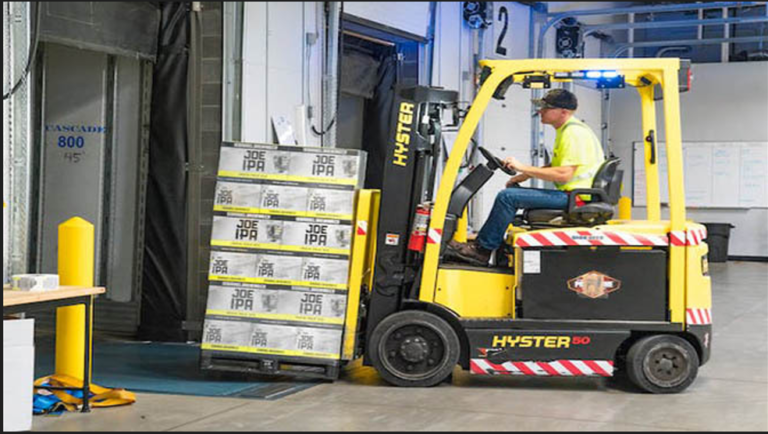
In today’s dynamic warehouse and logistics environments, the demand for skilled forklift operators, particularly order pickers, continues to grow. This article delves into the responsibilities of a forklift order picker and the importance of obtaining a forklift operator license.
Understanding the Role of a Forklift Order Picker
What is a Forklift Order Picker?
A forklift order picker is a specialized role within warehouse operations responsible for retrieving goods from storage and preparing them for shipment or further processing. They use order picker forklifts, also known as cherry pickers, to navigate aisles and pick items from elevated shelves.
Responsibilities of a Forklift Order Picker
The primary duties include locating and picking items based on order lists, maintaining inventory accuracy, and ensuring timely delivery of goods. Precision, efficiency, and attention to safety are paramount in this role.
Importance of Forklift Operator License
Why Obtain a Forklift Operator License?
Operating a forklift requires specific skills and knowledge to ensure safety and productivity. Obtaining a forklift operator license not only fulfills legal requirements but also signifies competence in handling heavy machinery.
Legal Requirements and Safety Standards
Most jurisdictions mandate that forklift operators hold a valid license. This requirement stems from safety regulations established by organizations like OSHA (Occupational Safety and Health Administration), emphasizing the importance of training and certification.
Training and Certification Process
Steps to Become a Certified Forklift Operator
To become certified, individuals typically undergo formal training, which covers forklift operation techniques, safety protocols, and practical skills assessments. Certification programs may vary in duration and complexity but generally involve classroom instruction and hands-on experience.
Training Programs Available
Numerous institutions and vocational schools offer forklift operator training programs. These programs equip aspiring operators with the necessary skills and knowledge required to navigate warehouse environments effectively.
Job Opportunities for Forklift Operators
Industries Hiring Forklift Operators
Forklift operators are employed across diverse industries such as manufacturing, retail, distribution, and construction. The increasing reliance on efficient material handling has contributed to sustained demand for skilled operators.
Career Growth Prospects
Experienced forklift operators often advance to supervisory roles or specialize in specific areas of warehouse management. Continuous professional development enhances career prospects within the logistics sector.
Skills Required
Essential Skills for Forklift Order Pickers
Apart from operating forklifts, order pickers must possess organizational skills, attention to detail, and adaptability to varying work environments. Effective communication and teamwork are also essential attributes.
Advantages of Having Additional Skills
Proficiency in inventory management systems, basic computer literacy, and familiarity with safety protocols further enhance job performance and open doors to broader career opportunities.
Safety Measures and Regulations
Safety Precautions in Operating Forklifts
Safety is paramount in forklift operations. Operators must adhere to speed limits, maintain clear visibility, and use safety equipment like seat belts and helmets to prevent accidents.
OSHA Guidelines for Forklift Operators
OSHA provides comprehensive guidelines outlining safe practices for forklift operators, including load handling, pedestrian safety, and equipment maintenance. Compliance with these standards is critical for workplace safety.
Technology Advancements in Forklift Operations
Automation in Warehouse Management
Technological advancements, such as automated guided vehicles (AGVs) and RFID (Radio Frequency Identification), are transforming warehouse operations, improving efficiency, and reducing human error.
Impact of Technology on Forklift Industry
Integration of telematics and IoT (Internet of Things) enables real-time monitoring of forklift fleets, optimizing routes and maintenance schedules. These innovations enhance productivity and safety.
Challenges Faced by Forklift Operators
Common Issues and How to Overcome Them
Forklift operators encounter challenges like navigating tight spaces, handling fragile goods, and maintaining equipment reliability. Training and experience mitigate these challenges, ensuring smooth operations.
Best Practices for Efficient Order Picking
Strategies to Improve Productivity
Implementing lean principles, optimizing warehouse layouts, and utilizing picking technologies streamline order fulfillment, reducing cycle times and operational costs.
Environmental Impact
Sustainable Practices in Forklift Operations
Adopting electric or hybrid forklifts, optimizing energy consumption, and recycling packaging materials contribute to sustainability initiatives within the logistics sector.
Green Initiatives in Warehousing
Companies are increasingly embracing eco-friendly practices, such as solar-powered warehouses and carbon-neutral operations, to reduce environmental footprint.
Cost Considerations
Budgeting for Forklift Operations
Balancing equipment procurement costs with maintenance expenses is crucial for efficient budget allocation. Leasing options and preventive maintenance programs help manage costs effectively.
Cost-saving Measures
Routine maintenance, operator training, and implementing efficient workflows contribute to cost savings in forklift operations, improving overall profitability.
Forklift Maintenance and Upkeep
Importance of Regular Maintenance
Scheduled maintenance routines ensure optimal performance and extend the lifespan of forklifts. Timely repairs prevent breakdowns and minimize downtime.
Tips for Longevity of Forklift Equipment
Proper handling, routine inspections, and adhering to manufacturer guidelines prolong the longevity of forklift equipment, reducing replacement costs.
Future Trends in Forklift Industry
Predictions and Innovations
The future of forklifts is poised for automation and robotics integration, enhancing efficiency and safety. Predictive maintenance and AI-driven logistics solutions will revolutionize material handling practices.
Conclusion
The role of a forklift order picker is integral to modern supply chains, requiring specialized skills and safety consciousness. Obtaining a forklift operator license is not only a legal requirement but also a testament to professionalism and competency in warehouse operations.
FAQs
How long does it take to obtain a forklift operator license?
The duration varies depending on the training program, but certification can typically be completed within a few weeks.
What are the career prospects for certified forklift operators?
Certified forklift operators have opportunities in various industries with potential for career advancement into supervisory or specialized roles.
What are the common challenges faced by forklift operators?
Challenges include maneuvering in tight spaces, handling delicate loads, and ensuring compliance with safety protocols.
How can technology improve forklift operations?
Technologies like automation, IoT, and telematics enhance efficiency, safety, and predictive maintenance in forklift operations.
What are the environmental benefits of electric forklifts?
Electric forklifts reduce emissions, contributing to sustainable warehouse operations and lowering overall carbon footprint.